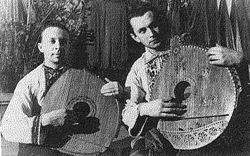
Zinoviy Shtokalko
Encyclopedia

Bandura
Bandura refers to a Ukrainian plucked string folk instrument. It combines elements of a box zither and lute, as well as its lute-like predecessor, the kobza...
art, one of the prominent is that of bandurist
Bandurist
A bandurist is a person who plays the Ukrainian plucked string instrument known as the bandura.-Types of performers:There are a number of different types of bandurist who differ in their paricular choice of instrument, the specific repertoire they play and manner in which they approach their...
virtuoso Zinoviy Shtokalko.
Biography
Shtokalko was born 25 May 1920 in the West Ukrainian town of BerezhanyBerezhany
Berezhany is a city located in the Ternopil Oblast of western Ukraine. It is the administrative center of the Berezhanskyi Raion , and rests about 100 km from Lviv and 50 km from the oblast capital, Ternopil. The city has a population of about 20,000, and is about 400 m above sea level...
, the son of a priest. As a youth he showed a great interest in music and folk songs. His family had a bandura which his father rev. Pavlo Shtokalko had purchased in 1925 in Prague. Shtokalko initially took private bandura lessons from Yukhym Klevchutsky, and later, during his studies in Lviv
Lviv
Lviv is a city in western Ukraine. The city is regarded as one of the main cultural centres of today's Ukraine and historically has also been a major Polish and Jewish cultural center, as Poles and Jews were the two main ethnicities of the city until the outbreak of World War II and the following...
took lessons from the Galician bandurist Yuri Singalevych, and during the war was strongly influenced by Kharkiv bandurists Hryhory Bazhul and Leonid Haydamaka
Leonid Haydamaka
Leonid Hryhorovych HaydamakaLeonid Haydamaka has left his impression on the development of bandura art in the 20th century....
. Shtokalko consistently collected the smallest snipets of information about the bandura and the kobzari and was able to include them in his performances. He consistently worked on collecting and studying everything associated with the bandura and the development of bandura technique.
His technique reached new heights of virtuosity.
Shtokalko was a doctor of medicine by day. His medical studies commenced in Lviv and he completed them in 1950 in Munich
Munich
Munich The city's motto is "" . Before 2006, it was "Weltstadt mit Herz" . Its native name, , is derived from the Old High German Munichen, meaning "by the monks' place". The city's name derives from the monks of the Benedictine order who founded the city; hence the monk depicted on the city's coat...
after which he emigrated to the United States. During his studies, and later his work, he never neglected his bandura playing.
Repertoire
In the United States, Shtokalko took part in the performances by the bandura ensemble led by Stepan Hanushevsky, performed on Ukrainian Television programs, and gave individual recitals of bandura music. All this took place outside of his work in his busy medical practice. Apart from this he also composed music. He arranged many Ukrainian folk songs, wrote the words to numerous songs, composed instrumental works such as 2 versions of the etude "Son" (Dream), "Oriental etude" and 2 versions of "Atonal etude" where he explored the technical potential of the bandura.Shtokalko can also be credited with the revival of the ancient byliny
Bylina
Bylina or Bylyna is a traditional Russian oral epic narrative poem. Byliny singers loosely utilize historical fact greatly embellished with fantasy or hyperbole to create their songs...
(traditional epic poems) of Kievan Rus'
Kievan Rus'
Kievan Rus was a medieval polity in Eastern Europe, from the late 9th to the mid 13th century, when it disintegrated under the pressure of the Mongol invasion of 1237–1240....
. He was able to recreate three bilyny: "About the great bohatyr - Illiya Murometz and the Nightingale robber", "About Dobrynia and the Dragon" and "About the great bohatyrs Sviatohor and Illiya Murometz".
Recordings
In his repertoire Shtokalko had a huge reserve of historic songs and dumyDuma (epic)
A Duma is a sung epic poem which originated in Ukraine during the Hetmanate Era in the sixteenth century...
(sung epic poems), many of which were recorded during the life of the bandurist. Of the more professional recordings are the dumy: "Marusia Bohuslavka" which was released in 1952 by the SURMA company in New York.
After the death of Shtokalko, the renown collector of Ukrainian recordings Stepan Maksymiuk found the recordings of two more dumy in the archives of M. Surmach, the tapes of "About Oleksiy Popovych" and "About the escape of three brothers from Oziv". Maksymiuk also discovered a recording of the duma "Kozak Holota" which was done live by an amateur collector during a concert performance of Shtokalko. These three dumy were after editing together with "Marusia Bohuslavka" appeared as a record album sponsored by Myron Surmach.
Death brought a halt to the work of Zinovyj Shtokalko. He died 18 June 1968 at the age of 48. Many of his plans were unrealized during his lifetime. Recently his textbook for the bandura was published in both English and Ukrainian. A collection of Ukrainian songs arranged by Shtokalko has also been recently published in Ukraine. (All 3 publications were prepared for publication and edited by Dr. A. Horniatkevyc)
Publications
- A Kobzar's Handbook - Edmonton-Kiev, 1992
- Kobza - Edmonton-Kiev, 1997 - Introduction by A. Horniatkevyc
Sources
- Odarchenko, Petro - Ukrainski dumy u vykonannia Bandurysta Zinoviya Shtokalka - 1/II/1971
- Horniatkevych, A. - Kobzars'ka slava Zinoviya Shtokalky - NTE - 1994, #5-6, pp. 70–72
- Shtokalko Zinoviy - NTE, 1990#6 p 80-81

